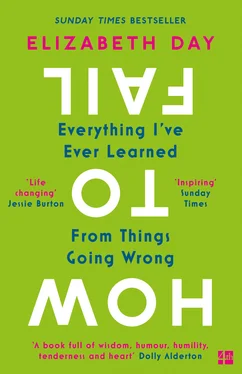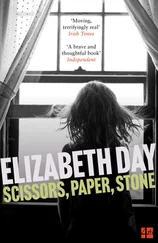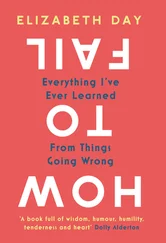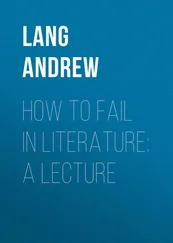I had also learned some valuable lessons about how to be popular from my earlier experiences. I knew to stand back a bit and take stock. To be cautious about revealing myself too quickly for who I really was. I needed to suss out the other girls first and assess the group dynamic before making my move.
So it was that, aged thirteen, I approached my first day as a new girl with Machiavellian intent. My strategy was simple: I would identify the most popular girl in my year and I would befriend her. I would observe the way she dressed and spoke and what she did with her hair. Then I would copy it. This I did. It worked like a dream.
It was, in some respects, relatively straightforward and a matter of acquiring and doing the right sort of things. I bought River Island black hipster trousers. I said I fancied Robbie Williams from Take That. I drank Cinzano straight from the bottle on a park bench because you had to get drunk to be cool. I had a boyfriend in my final year and went to the Algarve with a group of friends to celebrate the end of our A levels. It was the first time I’d ever stayed up to watch the sun rise. On the surface, at least, I appeared to belong. I was one of the cool ones.
After my earlier failures, I was indubitably better at playing the game. I got good grades and made real friends. The teachers liked me. Still, I didn’t much like school. I always felt resentful that I wasn’t in control of my own life. I wanted, more than anything, to be an adult and in charge of my own existence. I was impatient to get on with things, to have a job, to live in my own flat and pay my own rent. In fact, I couldn’t wait to leave.
I had a growth spurt at the age of fourteen and people frequently told me I seemed older than I was. It caused some confusion when I visited my sister at university. When we went out for a black-tie dinner with some of her male postgraduate friends, I was keenly aware that I didn’t want to embarrass her. I wore a black dress, with white buttons all the way down the front (River Island again. I really did love that shop). Halfway through the Chinese meal, I was told that one of the men had taken a shine to me. He tried to strike up conversation across the table. I politely asked what degree he was taking and after a few moments of chit-chat he said:
‘So what are you up to at the moment?’
‘I’m in the first year of studying for my GCSEs,’ I replied.
His lower lip trembled as if he’d been punched. No more conversation was forthcoming.
I suppose what I’m getting at is that, one way or the other, I never entirely fitted in. I was immature in some ways (horrifyingly unworldly) and overly mature in others (I asked for a three-quarter-length camel coat for my eighteenth birthday). Adults assumed I was capable because, by now, I was tall and good at exams and well behaved in class, but really I was just trying to work things out and I still barely knew myself. I always felt something of an outsider – in Ireland because I spoke like a foreigner; in England because I hadn’t grown up there.
But this social failure at school had some positive by-products. At an early age, it made me into an observer of human behaviour. I started to listen more than I talked. It’s a skill that has been incredibly useful as a writer. And because I wasn’t born cool but had to learn how to fake it, I like to think I have a degree of empathy for others who have never felt they belonged. When it came to writing my fourth novel, The Party , I mined my own experiences of being a scholarship kid on their first day in an unfamiliar environment for my protagonist, Martin Gilmour.
I have often been asked at literary festivals how I imagined myself into the character of a misfit teenage boy and the truth is, I based it on what I felt at the time. The emotions were so vivid to me that I can feel them still. (Although it’s worth pointing out here that Martin is a borderline sociopath who inveigles his way into his best friend’s life with disastrous consequences. That’s where any similarity between him and me ends.)
It’s interesting how many of the successful people I’ve interviewed, both for the podcast and as a journalist, have felt a similar sense of alienation at school. I’ve found that a surprising number of performers – specifically comedians – had parents in the military and therefore moved around a lot as children. They got used to adapting to new environments and often the easiest way to make friends was to crack jokes or act the class clown. It’s not a giant leap to think that this was what shaped their talent for performance. Jennifer Saunders, Dawn French, Adrian Edmondson, Jessica Alba and Christina Aguilera all came from military families.
There’s a sense, too, in which not being able to fit in makes you cultivate independence and resilience. If you move around a lot, you become used to making the most of your own company. If you’re like me, you lose yourself in stories and imagination and create rich internal worlds to counterbalance the external complexities.
When I interviewed Clint Eastwood in 2008, he recalled his own itinerant childhood as his father, a steel worker, travelled up the West Coast of America looking for work in the 1930s.
‘It was kind of lonely in some ways because you never went to the same school for six or seven months, you were always moving on somewhere,’ Eastwood said.
The rap star Wiz Khalifa, too, was a military brat. I spoke to him about it for Elle magazine in 2015. We met in a classic Los Angeles hip-hop pad – all white walls and clean angles and heavy clouds of weed obscuring the view of the Hollywood Hills beyond and he told me he moved bases every couple of years – to Germany, the UK and Japan.
Always being the new, ‘nerdy’ kid at school made him ‘nervous’ so music was his refuge: ‘Seeing everybody else being confident and knowing everybody, and me just kind of coming from the outside, it wasn’t comfortable at all,’ he said. ‘But doing my music, it was just my way of being the best at what I was interested in.’
He later turned his music into a chart-topping career and a net worth of $45 million.
But it wasn’t just the army kids who struggled to fit in. The novelist Sebastian Faulks told me he ‘loathed’ the boarding school he was sent to at the age of eight. Later, he went to Wellington College, which he ‘disliked intensely’.
‘It was traumatic, undoubtedly because the world you found yourself in, it just bore no relation to any world I’d ever known,’ he said. ‘Iron bedsteads, weird clothes, weird food, Latin, Greek, hymns and … there was no experience for the first sort of month that I’d ever had before. But eventually you sort of got used to it. And I remember one term I didn’t go home at all because there was some sort of mumps outbreak and in some ways it was easier not to go home at all actually. And I learned to fit in and adapt.’
The actress Christina Hendricks, who starred as Joan in the hit series Mad Men , was bullied at school. When I interviewed her for the Observer in 2014, she told me her parents had moved from Idaho to Virginia because of her father’s job when she was thirteen. She hated her new high school and felt ‘uprooted’ and resentful.
She wore Birkenstocks and ‘hippy dresses’. She was surprised when she saw the other girls her age at her new school ‘carrying purses [handbags]. I was like, “Ooh, purses!” To me, only moms had purses. They were much more sophisticated and they were having sex and wearing make-up – all these things that had not happened for me.’
From the start, Hendricks was singled out. ‘We had a locker bay, and every time I went down there to get books out of my locker people would sit on top and spit at me. So I had to have my locker moved because I couldn’t go in there … I felt scared in high school. It was like Lord of the Flies . There was always some kid getting pummelled and people cheering.’
Читать дальше












